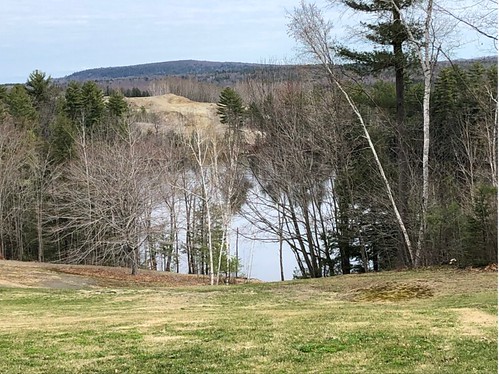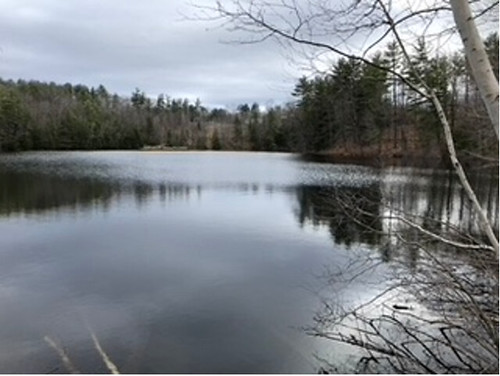I live in a town of 700 people in rural Central Maine. A few miles from me there’s a hill where you can look down into a working gravel and sand pit and see a circle of water. That’s a kettle hole pond, a neighbor told me once when we passed it. It’s very deep and there’s no inlet and no outlet, he said. I’d never heard of the term kettle hole, but his words stuck in my brain. There was something mysterious and evocative about them.

This is a view down into the kettle hole pond.

You can see the working gravel and sand pit in the background.
When I started writing my second middle-grade novel, The Natural Genius of Ants, I set it in the fictional town of Kettle Hole, Maine, and the kettle hole pond the town is named after plays a big part in the plot. In the book, there’s a legend that whoever swims in the pond will always return to Kettle Hole. The other legend is that the pond is bottomless. Harvard, the main character in the book, is fascinated by both these stories.
Harvard’s father is a doctor who made a mistake at work that he can’t forgive himself for. He comes back to his hometown of Kettle Hole for the summer and brings Harvard and his little brother Roger with him. Harvard has never been there before. When his father’s childhood friend takes him to see the kettle hole pond, Harvard learns a story he never knew about a time his father and his father’s friend went into the pond.
While writing the book, I got permission from the owner of the gravel pit to go down and see the kettle hole. He told me that someone had used a ‘fish-finder’ that could register a depth of 60 feet, and this pond was even deeper than that! Seeing what kind of trees grew there and what the water looked like helped me write a scene where Harvard tries to go into the pond.

Down by the kettle hole pond in Smithfield, Maine.
I also did research into how the ponds are made. They were created by “dead ice” left behind by the retreating glaciers of the Laurentine ice sheet over ten thousand years ago. Eventually the ice melted and, combined with the surrounding sediment, left the kettle depression behind. There twelve states that have kettle holes. They are found as far south as the 37th parallel along the southern borers of Missouri, Kentucky and Virginia and in northern Europe, Asia and even New Zealand.

A kettle hole in Greenland.
If you ask local fishermen and look around in the woods, you might find a kettle hole, too. Harvard would tell you to be careful if you want to swim in one as they can have very steep sides. He’d advise you to bring both a rope and a buddy!

In The Natural Genius of Ants, Harvard's dad is a doctor, caring for the smallest and sickest babies in the hospital where he works. After a mistake leads to tragedy, Dad isn't the same, but a summer trip back to his hometown of Kettle Hole, Maine, could be just what the doctor ordered.
In the small town where he grew up, Dad seems more himself. Especially once the family decides to start an ant farm–just like Dad had as a kid! But when the mail-order ants are D.O.A., Harvard doesn't want Dad to experience any more sadness. Luckily, his new friend Neveah has the brilliant idea to use the ants crawling around the kitchen instead. But these insects don't come with directions. So the kids have a lot to learn–about the ants, each other, and how to forgive ourselves when things go wrong.
Culley draws on her time as a pediatric nurse in Maine, as well as keeping her own ant farm and caring for a carpenter ant queen, in this lyrical coming-of-age story about forgiveness, moving forward, and coming home. The Natural Genius of Ants is a perfect summer read for budding scientists, as well as fans of her first award-winning middle grade novel Down to Earth.
About the Author
Betty Culley's debut novel in verse, Three Things I Know Are True, was a Kids' Indie Next List Top Ten Pick, an ALA-YALSA Best Fiction for Young Adults Nominee, and the 2021 Maine Literary Book Award Winner for Young People's Literature. Her first middle-grade novel Down to Earth was inspired by her fascination with meteorites, voyagers from another place and time. She's an RN who worked as an obstetrics nurse and as a pediatric home hospice nurse. She lives in central Maine, where the rivers run through the small towns. Visit her online at www.bettyculley.com and the following socials:
https://www.instagram.com/bettyculley/
